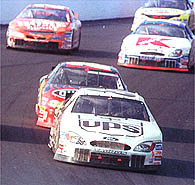|
Teacher Page A WebQuest for 6th Grade (Math, Writing, Technology) Designed by Nathan Crowder [email protected]
Introduction | Learners | Standards | Process | Resources | Evaluation | Conclusion | Credits | Student Page
This lesson was developed as a webquest project for Dr. Messner and Dr. Ulmer's Literacy, Technology, and Instruction Spring 2002 class at Appalachian State University . This project is also being used
to fulfill the North Carolina
This lesson is designed for 6th grade. The focus of this lesson is on Math and Writing. The students will use technology throughout the lesson. Learners will need to know basic computer skills such as word processing, keyboarding and internet usage. Students will also need to have some background on collecting data, making graphs, and making brochures. Curriculum Standards This webquest aligns with several competency goals from the North Carolina Standard Course of Study for sixth grade math, language arts and computer and technology skills. Math Standards Addressed Competency Goal
4: The learner will demonstrate an understanding and use of graphing,
probability, and data analysis.
Language Arts Standards Addressed Competency Goal 1: The learner will use language to express individual perspectives drawn from personal or related experience. 1.03 Interact appropriately in group settings by:
2.01 Explore informational materials that are read,
Competency Goal 2: The learner will demonstrate knowledge and skills in the use of computer and other technologies. 2.1 Use keyboarding skills to increase productivity and accuracy. (KU/WP/DTP) Competency Goal 3: The learner will use a variety of technologies to access, analyze, interpret, synthesize, apply, and communicate information.
3.1 Select and use technology tools to collect,
You can paste in the process description given to students on the student page and then interleave the additional details that a teacher might need. Describe briefly how the lesson is organized. Does it involve more than one class? Is it all taught in one period per day, or is it part of several periods? How many days or weeks will it take? Is it single disciplinary, interdisciplinary, multidisciplinary or what? If students are divided into groups, provide guidelines on how you might do that. If there are misconceptions or stumbling blocks that you anticipate, describe them here and suggest ways to get around them. What skills does a teacher need in order to pull this lesson off? Is it easy enough for a novice teacher? Does it require some experience with directing debates or role plays, for example? Variations If you can think of ways to vary
the way the lesson might be carried out in different situations (lab vs.
in-class, for example), describe them here.
Describe what's needed to implement this lesson. Some of the possibilities:
Describe also the human resources needed. how many teachers are needed to implement the lesson. Is one enough? Is there a role for aides or parents in the room? Do you need to coordinate with a teacher at another school? With a partner in industry or a museum or other entity? Is a field trip designed in as part of the lesson? How will you know that this lesson was successful? Describe what student products or performances you'll be looking at and how they'll be evaluated. This, of course, should be tightly related to the standards and objectives you cited above. You may want to just copy and paste the evaluation section of the student page into this space and add any clarifications needed for another teacher to make use of this lesson. Make some kind of summary statement here about the worthiness of this lesson and the importance of what it will teach. List here the sources of any images, music or text that you're using. Provide links back to the original source. Say thanks to anyone who provided resources or help. List any books and other analog media that you used as information sources as well. Last updated on August 15, 1999. Based on a template from The WebQuest Page |
|
